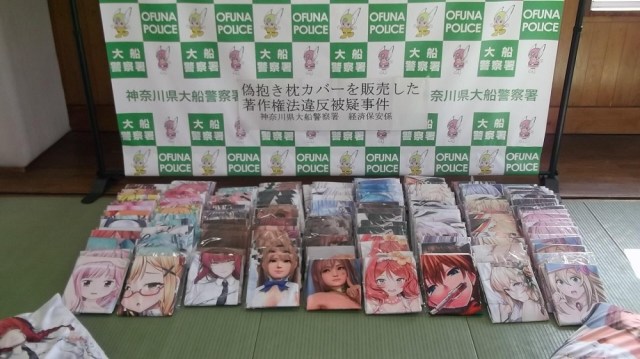
Prosecutors plan to throw the book, not the pillows, at him.
On Tuesday, the Kanagawa Prefectural Police filed charges with the Yokohama public prosecutor’s office against a 44-year-old man. The crime he stands accused of?
Illegal counterfeit anime girl huggy pillow cover trafficking.
According to Japan’s Association of Copyright for Computer Software (ACCS), the man, a resident of the town of Ofuna, Kanagawa Prefecture, was found to be in possession of 72 counterfeit items bearing the likeness of 12 characters from 10 different series, with a partial list from the ACCS indicating:
● From Magia Record Puella Magi Madoka Magica Gaiden: Iroha Tamaki
● From Dead or Alive 6: Marie Rose, Honoka, Rachel, Christie, Hitomi, Leifang
● From Granblue Fantasy: Europa, Monika
● From To Love-Ru Darkness: Momo Belia Deviluke
As always, investigators arranged the evidence with all the care and precision of a top-notch anime specialty store setting up its table in a convention dealer’s room, in which we can also spot Chainsaw Man’s Makima and Yu-Gi-Oh!’s Dark Magician Girl. Oh, and there’s also Evangelion’s Asuka clamping her teeth down on what appears to be a permanent marker, which I’m just going to go ahead and assume is a fetish since I don’t need my search history getting any weirder than my line of work has already made it.
▼ A photo from the Kanagawa Prefectural Police’s Ofuna Precinct

As for why all the pillow covers are folded into squares, well, going outside the bounds of officially licensed huggy pillow covers tends to result in a lot of exposed skin, and the purpose of the display is to tell the public “Look how much evidence there is!”, not “Check out these hot girls!” The man, who purchased and resold the covers online, stands accused of violation of copyright law, and has admitted to the charges. Prosecutors say they will be seeking “heavy punishment.”
At this point, some might be wondering why this is being treated as a crime while doujinshi, self-published fan comics that might use preexisting copyrighted characters, are so often given a free pass in Japan. While the police have made no official statement on the matter, the key factors in overlooking the copyright infringement represented by doujinshi tend to be quantity, timing, and distribution method.
Publishers and police tend to let doujinshi slide as long as its produced in small batches to be sold on-site at short-term events, like Tokyo’s Comiket. In this case, though, the pillow cases were being sold continuously over the Internet, and a search of the man’s house turned up roughly 600 more, in addition to the 72 he was initially found to be in possession of. Between 2018 and last summer, when his operation was shut down, the man is estimated to have sold about 12 million yen (US$93,000) worth of fake huggy pillow cases, which is apparently enough to cross the line from “fan creatively expressing their love for a series” into “just in it to make a pile of cash,” so all those confiscated covers are going to go unhugged and unloved.
Source: ACCS via IT Media, Yomiuri Shimbun
Top image: Pakutaso
Insert image: Kanagawa Prefectural Police Ofuna Precinct/ACCS
● Want to hear about SoraNews24’s latest articles as soon as they’re published? Follow us on Facebook and Twitter!

No hay comentarios:
Publicar un comentario